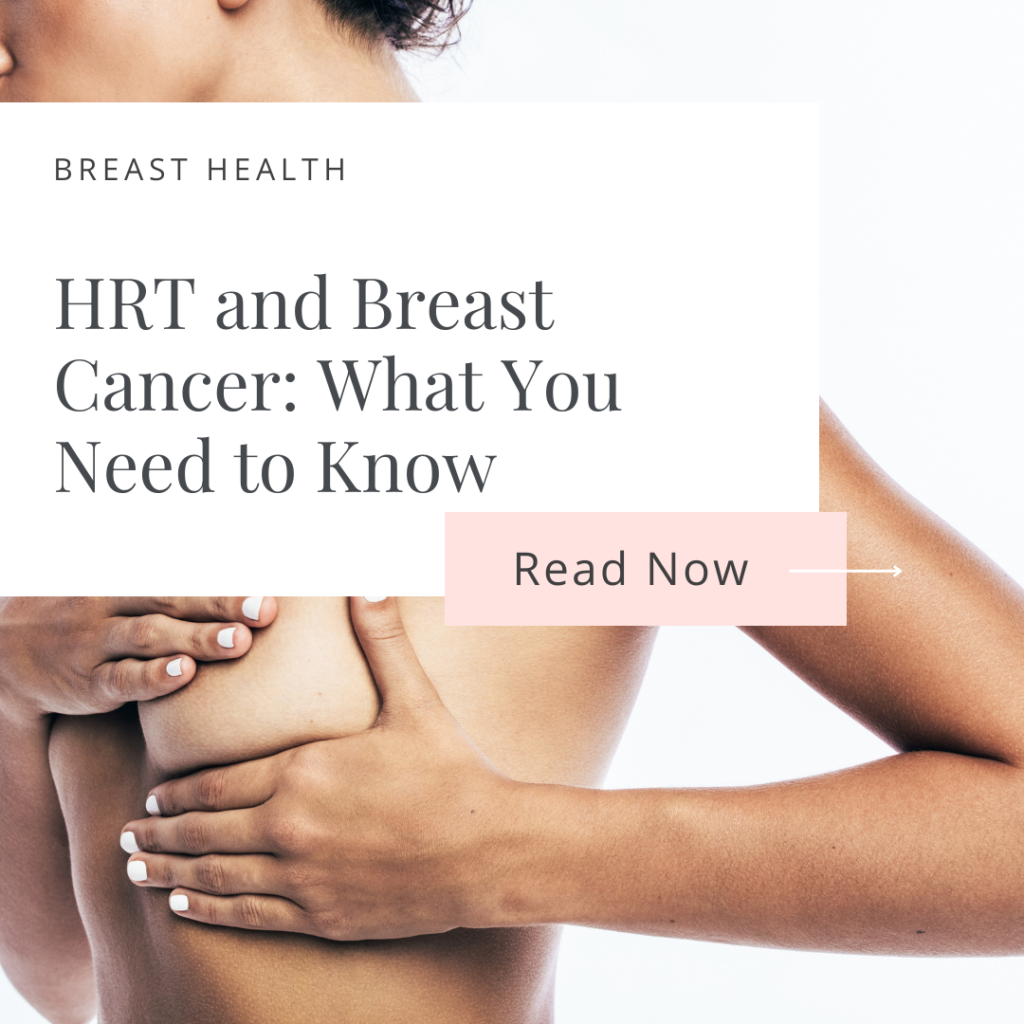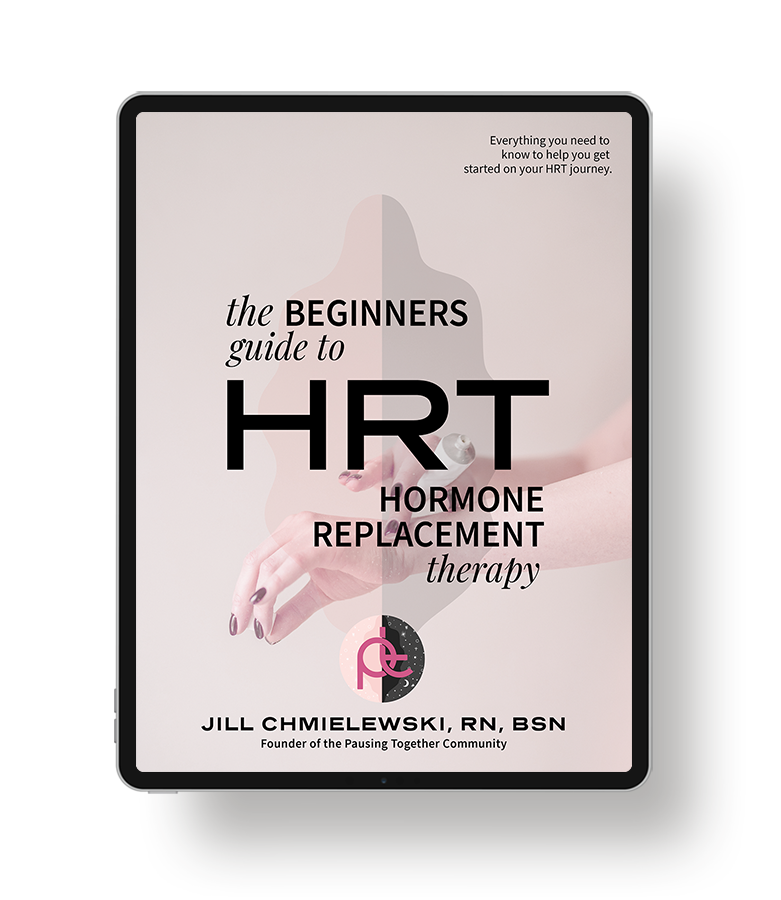
No one knows for sure what causes breast cancer to develop, although cancer stem cells (a kind of cell that has nothing to do with estrogen) are thought to play a role. Cancer causes are multifactorial and related to many issues, including inflammation, stress, exposure to radiation, viruses, chemicals, and other factors.
While genetic mutations have been one of the primary theories driving modern-day Big Pharma cancer treatments, research dating back to 1927 demonstrates that cancer is a metabolic disease. According to many cancer researchers, mitochondrial dysfunction (mitochondria are the energy-producing factories inside our cells) is a hallmark of all cancer cells. Cancer cells’ genetic mutations/abnormalities appear to occur secondary to mitochondrial dysfunction.
It is well known that estrogen regulates mitochondrial function and helps to repair DNA. That’s probably one of the many reasons that pregnancy is breast cancer-protective since estrogen soars sky-high during pregnancy.
Cancer is “cell growth out of control.” There are multiple regulatory systems inside our body to ensure that cancer cells do not grow out of control. If a woman develops breast cancer, or any cancer for that matter, that’s a sign that the body’s built-in check and balance systems are not working correctly.
If you are considering HRT, some factors may increase or decrease your of getting breast cancer:
- Older women are at a higher risk than younger women.
- Women who have their first pregnancy before age 20 are at a lower risk than women who had their first pregnancy after age 30
- Women who have had multiple pregnancies are at less risk than women with a single or no pregnancies.
- Breastfeeding decreases risk: the longer a woman breastfeeds, the more protection she gains.
- The use of the birth control pill increases the risk
- Women with greater BMI (body mass index) in post-menopause are at greater risk for developing breast cancer and other cancers. (In women who have previously had breast cancer, increasing BMI is also a risk factor for recurrence.)
- Moderate to heavy alcohol consumption increases the risk of breast cancer (moderate drinking is defined as one or more drinks per day, and heavy drinking is defined as three or more drinks on any day or more than seven drinks per week).
- Women who have issues with detoxification are at greater risk
- Women with a family history (near relatives like mom, aunt, or sister) of breast cancer have a small increased risk of breast cancer
- Women with increased breast density have a higher risk than women with less dense breasts
- Women with increased exposure to ionizing radiation (i.e., x-rays, mammograms, UV rays, gamma rays, etc.) have an increased risk for breast cancer
What does the research show about HRT and breast cancer risk?
- Replacing estrogen-alone (including synthetic estrogen, oral estradiol, and transdermal estradiol) does not increase breast cancer risk; it decreases breast cancer risk and mortality.
- Estrogen + progesterone does not increase breast cancer risk.
While there has been a bit of debate in the medical community on whether progestins increase a woman’s risk of developing breast cancer, there isn’t enough data that conclusively points to progestins increasing the risk. That said, we do know that progestins can have a stimulatory effect on breast cells. In contrast, progesterone, like that made in the body and available as a bioidentical progesterone HRT, does not stimulate breast cells; it is breast cancer protective. In a midlife woman’s body, where the immune system is not quite as effective as it was in her younger years, it seems best to err on the side of caution and avoid progestins whenever possible.
What about women who previously had breast cancer?
Most women have no idea that estrogen was used for years to treat metastatic breast cancer. Yep, it’s true. If estrogens were cancer-causing, then this treatment approach would not have worked. Dr. Avrum Bluming and Carol Tavris dedicated the entire first chapter of their book, Estrogen Matters to answering the question, “Does Estrogen Cause Cancer?” Here’s an excerpt from pages 51-52 of the book Estrogen Matters:
“Surely, the most disconfirming evidence for the claim that estrogen causes breast cancer is this: the administration of estrogen has been shown to have beneficial effects even in women with advanced breast cancer. For example, in 1944, Sir Alexander Haddow, director of the Institute for Cancer Research at the University of London, reported that 25 percent of his patients with advanced breast cancer improved when given high-dose estrogen, and other researchers subsequently have gotten the same or better results. Oncologist Bruno Massidda and his team at the University of Cagliari, Italy, reported remission in 50 percent of advanced breast cancer patients treated with estrogens, and so did Reshma Mahtani and colleagues at the Boca Raton Comprehensive Cancer Center. Gabriel N. Hortobagyi and colleagues at MD Anderson Cancer Center reported that the most effective therapy for metastatic carcinoma of the breast was combined estrogen-progestin. James Ingle and colleagues at Mayo Clinic demonstrated better survival among breast cancer patients treated with diethylstilbestrol (DES), a form of estrogen, compared to tamoxifen, as did Per Eystein Lønning and colleagues at Haukeland University Hospital in Norway. And the pioneer cancer researcher V. Craig Jordan and his research team demonstrated that both high and low doses of estrogen can shrink cancerous breast tumors. ”
Estrogen does not cause breast cancer; it’s breast cancer protective. I encourage you to pick up a copy of this book to learn more.
If estrogen doesn’t cause breast cancer, then why are so many women with breast cancer prescribed tamoxifen?
If you know anything about tamoxifen, you know that many people think of tamoxifen as an estrogen blocker. It is often recommended for its ability to block estrogen receptors in the breasts of women who have estrogen-receptor+ (ER+) breast cancer. What you may not know is that tamoxifen raises levels of circulating estrogen in premenopausal women up to five-fold.
Approximately 40% of women with ER+ breast cancer do not respond to tamoxifen, and many women with estrogen receptor-negative (ER-) breast cancer experience a therapeutic benefit from tamoxifen, pointing to tamoxifen’s benefits that have nothing to do with estrogen or its receptors. It’s not entirely known how tamoxifen works as a treatment for breast cancer, but it appears that it may inhibit growth factors involved in breast cancer and work in other ways unrelated to estrogen receptors. (There’s much more to the tamoxifen story than we have time for in this article ~ stay tuned for more).
What about HRT in women with ER+ breast cancer?
A common misconception about ER+ cancer is that estrogen causes the cancer. Not so. The term “ER+” stands for estrogen-RECEPTOR positive. What that means is that the tumor was found to have estrogen receptors in it. I’ve heard women and clinicians use the terms “estrogen-dependent” and “estrogen-mediated” when referring to breast cancer, and that’s an inaccurate way to describe an ER+ breast tumor.
Hormone receptors are found throughout the body. Nearly every organ in our body has receptors for estrogen. That’s how hormones deliver their messages. They “signal” receptors.
Our breast cells have hormone receptors for estrogen and progesterone. If a woman has an ER+ tumor, that means that the breast tumor has estrogen receptors. That’s a good thing because it shows that the tumor cells still have some of the normal characteristics of a breast cell. These cells usually grow slowly, which is why women with ER+ breast cancer typically have such a good prognosis. As Dr. Avrum Bluming and Carol Tavris point out in the book Estrogen Matters, “Indeed, in most breast cancers, estrogen-receptor positive cells are not the ones proliferating.”
The cells of early breast cancer, as well as the ones that multiply in breast tumors, are typically estrogen and progesterone receptor-negative. Cancer stem cells are thought to initiate tumor growth and recurrence, and these cells do not have receptors for estrogen or progesterone. These cells do not proliferate in response to estrogen.
Thus far, there have been twenty-five published studies of breast cancer survivors given HRT.
Four of those studies showed a reduced risk of developing breast cancer when using HRT. None, except the HABITS study (Hormone Replacement After Breast Cancer study), found an increased risk of breast cancer recurrence, and only in women who were taking tamoxifen along with HRT.
The 434 women enrolled in the HABITS study were randomized to a “no-HRT” group and a “treat with HRT” group. It should be noted that the HABITS study was a heavily flawed study that had many issues:
- Participants were not required to have any baseline imaging, so no one knew whether the participants had breast cancer when they began the study.
- 43 of the 171 women in the study’s placebo (no-HRT) arm decided to use HRT.
- 11 of the 174 women in the HRT arm of the study decided not to take HRT.
- There was no agreed-upon HRT regimen for those in the HRT arm of the study – it was left up to the provider’s discretion. (As you know, HRT’s type, dose, and form matters!)
In the HRT arm, twenty-six women were found to have breast cancer, whereas seven women in the no-HRT arm were found to have breast cancer, limited to local recurrences or contralateral tumors. There was no increase in metastatic cancer or death from breast cancer. And again, the HABITS trial, with its many design flaws, was the only study of twenty-five that showed a slightly increased risk.
Because of the study design, small sample size, and other study issues, it’s impossible to claim that HRT had anything to do with the increased risk. Yet millions of women have been denied HRT based on this single study when we know that HRT improves our quality of life and protects against a multitude of diseases.
What about women who currently have breast cancer?
As you’ve just read, cancer is complex and multifactorial. Estrogen does not cause cancer, and estrogens are critically important for their role in modulating our immune system (i.e., helping our immune system stay in Zen mode).
Currently, even the more conservative medical associations such as NAMS (North American Menopause Society) recommend that women who have genitourinary symptoms should be offered vaginal estrogen. Yet so many women continue to be denied access to any form of HRT.
If you were recently diagnosed with breast cancer, it’s important that you build a team of practitioners who are willing to discuss the benefits and risks of your breast cancer treatment as well as the benefits and risks of hormone therapy. There are risks to not using hormone therapy, and those should be discussed as well.
Women with a diagnosis of breast cancer are often told that they shouldn’t consider any HRT until their primary cancer has been treated. But for many women, a treatment regimen may include surgery, chemotherapy, radiation, and tamoxifen/aromatase inhibitors for 10+ years. For a lot of women, these treatments can have devastating consequences physically and mentally and significantly impact their relationships and their quality of life.
Women diagnosed with breast cancer while on hormone therapy have consistently been found to have better prognoses than women diagnosed who are not on hormonal therapies. So, we need to be thinking about the woman as a whole when discussing the known benefits and risks of HRT.
Like all treatments, HRT warrants a discussion of risks and benefits. It is up to you to decide if the benefits of using HRT outweigh the risks. The decision to use or not use HRT should be shared decision-making in partnership with your provider. It is your body; you are the only one who can and should decide what option is best for you.
If you are worried about cancer recurrence (which is understandable), I want you to know that your body has an innate wisdom and ability to heal. Modern medicine often takes a “Kill the cancer at all costs approach” without thinking about why cancer developed in the first place. There are reasons that cancer develops, and we often need to change the terrain of the body to make our bodies inhospitable to cancer growth and to help prevent recurrence.
If you want a holistic approach to cancer prevention and treatment, consider three of my favorite resources: Dr. Leigh Erin Connealy, Dr. Nalini Chilkov, and Marnie Clark.
What about women with a family history of breast cancer?
As I mentioned earlier, there are multiple causes of breast cancer. Genetics only accounts for 5-10% of breast cancer. Women with a family history of breast cancer should be offered a benefit vs. risk discussion with their provider.
What about women who carry the BRCA gene?
Women who carry the BRCA gene have an increased risk of developing breast cancer compared to women who do not carry the BRCA gene. That said, women with the BRCA gene who are on HRT have less risk of developing breast cancer than women with the BRCA gene who do not use HRT. And they have less risk of dying from breast cancer than women who do not use HRT.
I would strongly encourage you to pick up a copy of Estrogen Matters, which goes into great depth on the myth surrounding estrogen and breast cancer. Dr. Bluming wrote an excellent summary article published in The Cancer Journal called “Hormone Replacement Therapy After Breast Cancer: It Is Time.” I highly recommend you pick up a copy of this article and print one for your doctor.
You may also be interested in joining our Pausing Together Community, where we’ve discussed this topic many times with Dr. Rosensweet, our community’s guest expert on menopause.
References
- Ramesh B, et al. Breast cancer stem cells: Biology and therapeutic implications,
- The International Journal of Biochemistry & Cell Biology, Volume 107, 2019, Pages 38-52, ISSN 1357-2725, https://doi.org/10.1016/j.biocel.2018.12.001.
- Seyfried, Thomas N et al. “Cancer as a metabolic disease: implications for novel therapeutics.” Carcinogenesis vol. 35,3 (2014): 515-27. doi:10.1093/carcin/bgt480.
- Feigelson, Heather Spencer et al. “Body Mass Index and Risk of Second Cancer Among Women With Breast Cancer.” Journal of the National Cancer Institute vol. 113,9 (2021): 1156-1160. doi:10.1093/jnci/djab053.
- https://www.niaaa.nih.gov/alcohol-health/overview-alcohol-consumption/moderate-binge-drinking (Last accessed June 2023)
- Rosensweet, Daved. Happy Healthy Hormones. Daved Rosensweet, 2017.
- Hodis, H. N., and P. M. Sarrel. “Menopausal Hormone Therapy and Breast Cancer: What Is the Evidence from Randomized Trials?” Climacteric, vol. 21, no. 6, 2018, pp. 521–528., doi:10.1080/13697137.2018.1514008.
- Lignières, B. De, et al. “Combined Hormone Replacement Therapy and Risk of Breast Cancer in a French Cohort Study of 3175 Women.” Climacteric, vol. 5, no. 4, 2002, pp. 332–340., doi:10.1080/713605312.
- L’Hermite, M. “HRT optimization, using transdermal estradiol plus micronized progesterone, a safer HRT.” Climacteric: The Journal of the International Menopause Society vol. 16 Suppl 1 (2013): 44-53. doi:10.3109/13697137.2013.808563
- Simon, J A. “What’s new in hormone replacement therapy: focus on transdermal estradiol and micronized progesterone.” Climacteric: The journal of the International Menopause Society vol. 15 Suppl 1 (2012): 3-10. doi:10.3109/13697137.2012.669332.
- Avrum Bluming MD, Carol Tavris PhD. Estrogen Matters: Why Taking Hormones in Menopause Can Improve Women’s Well-Being and Lengthen Their Lives — Without Raising the Risk of Breast Cancer 1st Edition. Hachett Book Group 2018.
- Haddow, A et al. “Influence of Synthetic Oestrogens on Advanced Malignant Disease.” British Medical Journal vol. 2,4368 (1944): 393-8. doi:10.1136/bmj.2.4368.393.
- Massidda, B et al. “Terapia estrogenica del cancro avanzato della mammella” [Estrogen therapy of advanced breast cancer]. Minerva medica vol. 68,36 (1977): 2509-16.
- Mahtani, Reshma L et al. “High-dose estrogen as salvage hormonal therapy for highly refractory metastatic breast cancer: a retrospective chart review.” Clinical therapeutics vol. 31 Pt 2 (2009): 2371-8. doi:10.1016/j.clinthera.2009.11.002.
- Hortobagyi, G N et al. “Sequential cyclic combined hormonal therapy for metastatic breast cancer.” Cancer vol. 64,5 (1989): 1002-6. doi:10.1002/1097-0142(19890901)64:5<1002::aid-cncr2820640505>3.0.co;2-b
- Ingle, J N et al. “Randomized clinical trial of diethylstilbestrol versus tamoxifen in postmenopausal women with advanced breast cancer.” The New England Journal of Medicine vol. 304,1 (1981): 16-21. doi:10.1056/NEJM198101013040104.
- Lønning, P E et al. “High-dose estrogen treatment in postmenopausal breast cancer patients heavily exposed to endocrine therapy.” Breast cancer research and treatment vol. 67,2 (2001): 111-6. doi:10.1023/a:1010619225209.
- Craig Jordan, V et al. “Exploiting the apoptotic actions of oestrogen to reverse antihormonal drug resistance in oestrogen receptor-positive breast cancer patients.” Breast (Edinburgh, Scotland) vol. 16 Suppl 2, Suppl 2 (2007): S105-13. doi:10.1016/j.breast.2007.07.020.
- Breast Cancer Res Treat. 2016 Jan; 155(2):365-73. doi: 10.1007/s10549-016- 3685-3. Hormone replacement therapy after menopause and risk of breast cancer in BRCA1 mutation carriers: a case-control study.
- Cancer Res. 2005 Jul 1; 65(13):5506-11.Isolation and in vitro propagation of tumorigenic breast cancer cells with stem/progenitor cell properties.
- Clin Med. 2019 Dec 29; 9(1). pii: E87. doi: 10.3390/jcm9010087. Lipid Droplets Define a SubPopulation of Breast Cancer Stem Cells.
- Eur J Cancer. 2006 Jun; 42(9):1219-24. Breast cancer stem cells: an overview.
- Nature 2001; 414: 105–11. Stem cells, cancer, and cancer stem cells.
- Berkson, L. The Vindication of Estrogen ebook. 2020.
- Bluming, Avrum Zvi MD. Hormone Replacement Therapy After Breast Cancer: It Is Time. The Cancer Journal 28(3):p 183-190, 5/6 2022. | DOI: 10.1097/PPO.0000000000000595.





